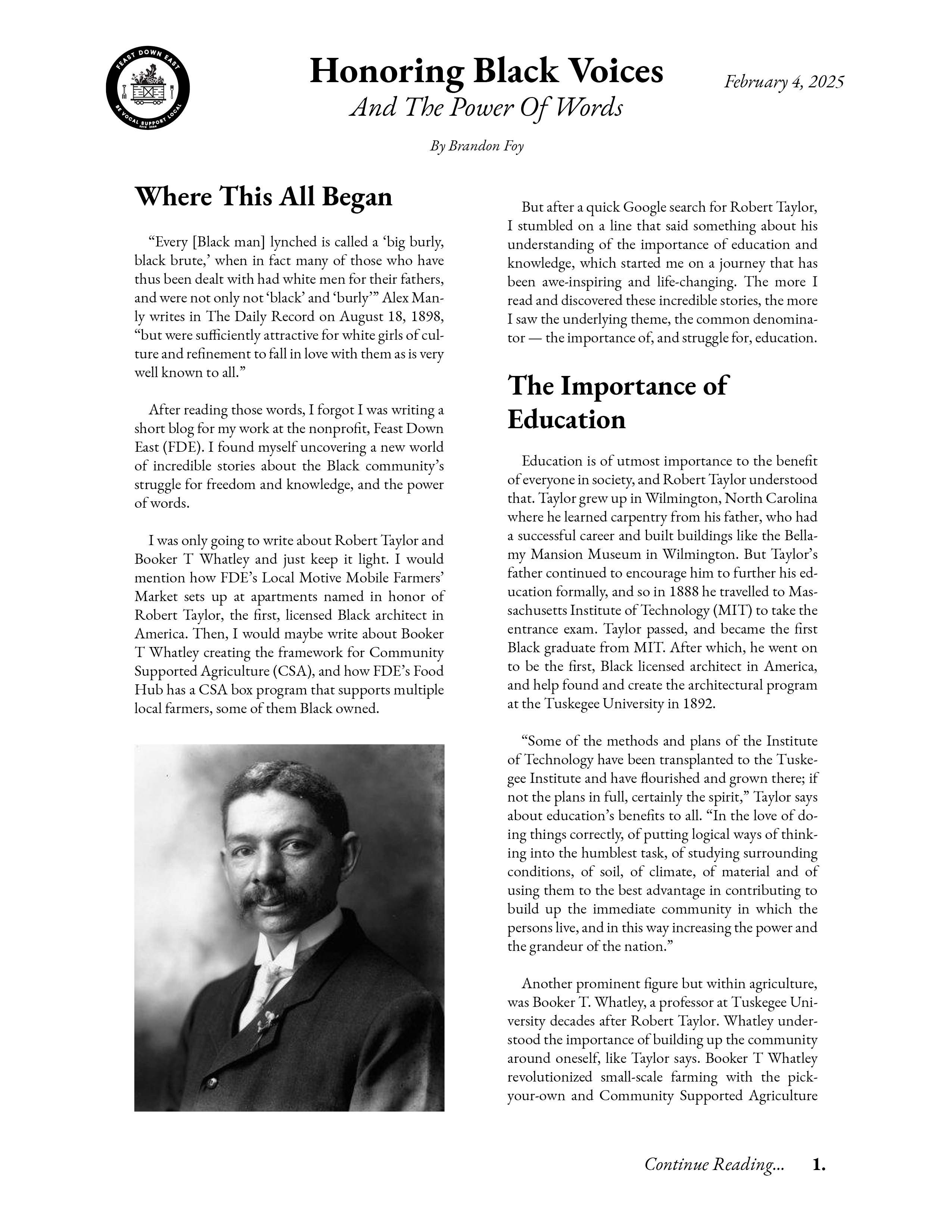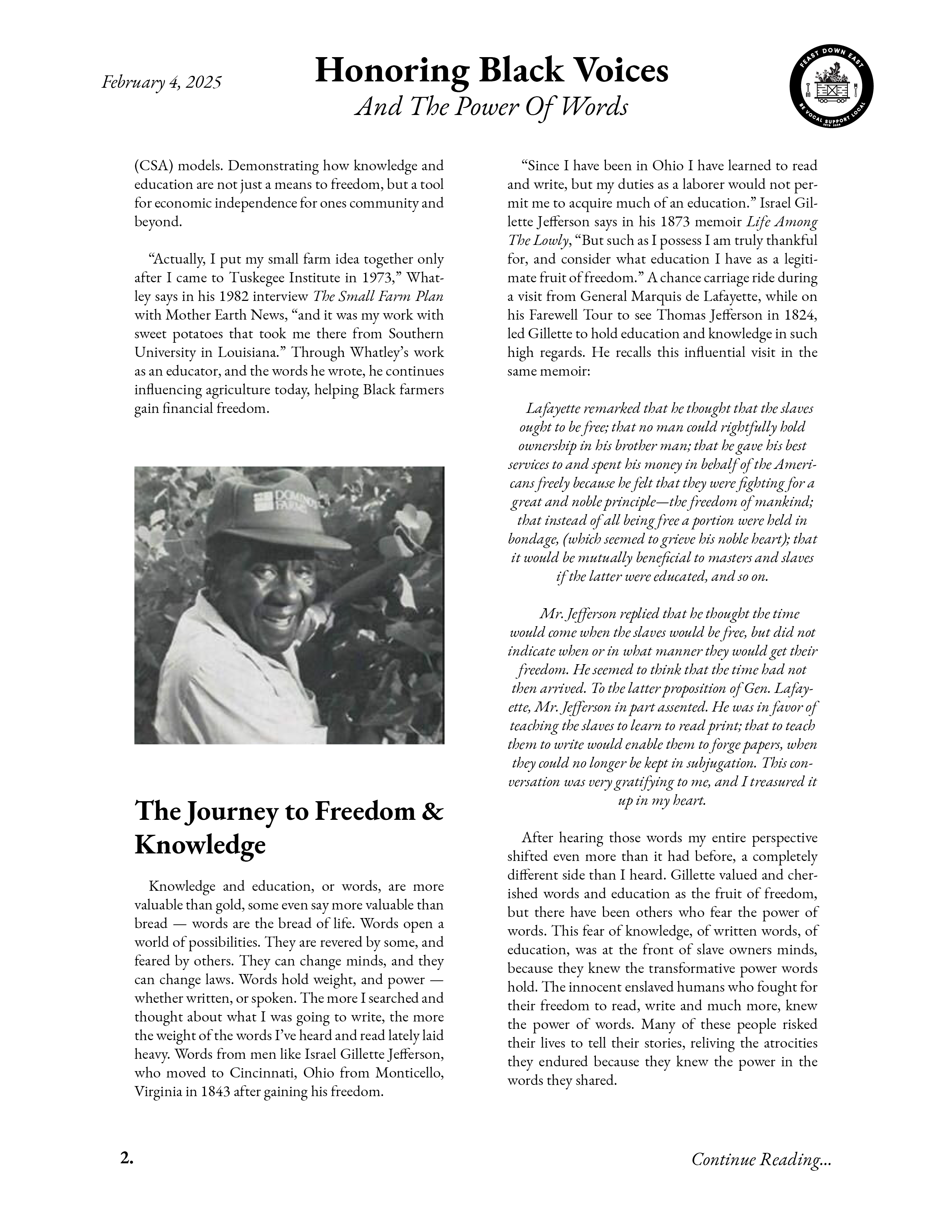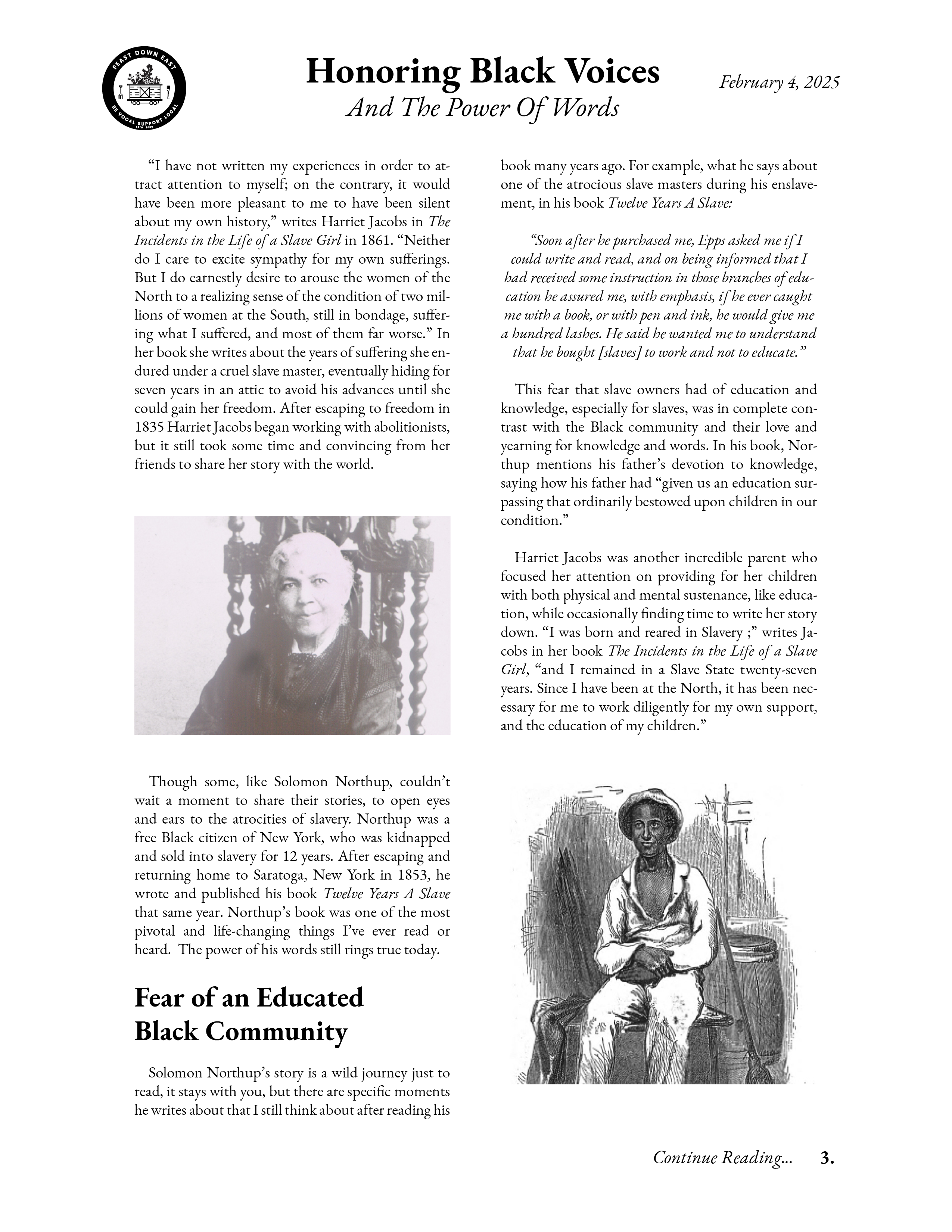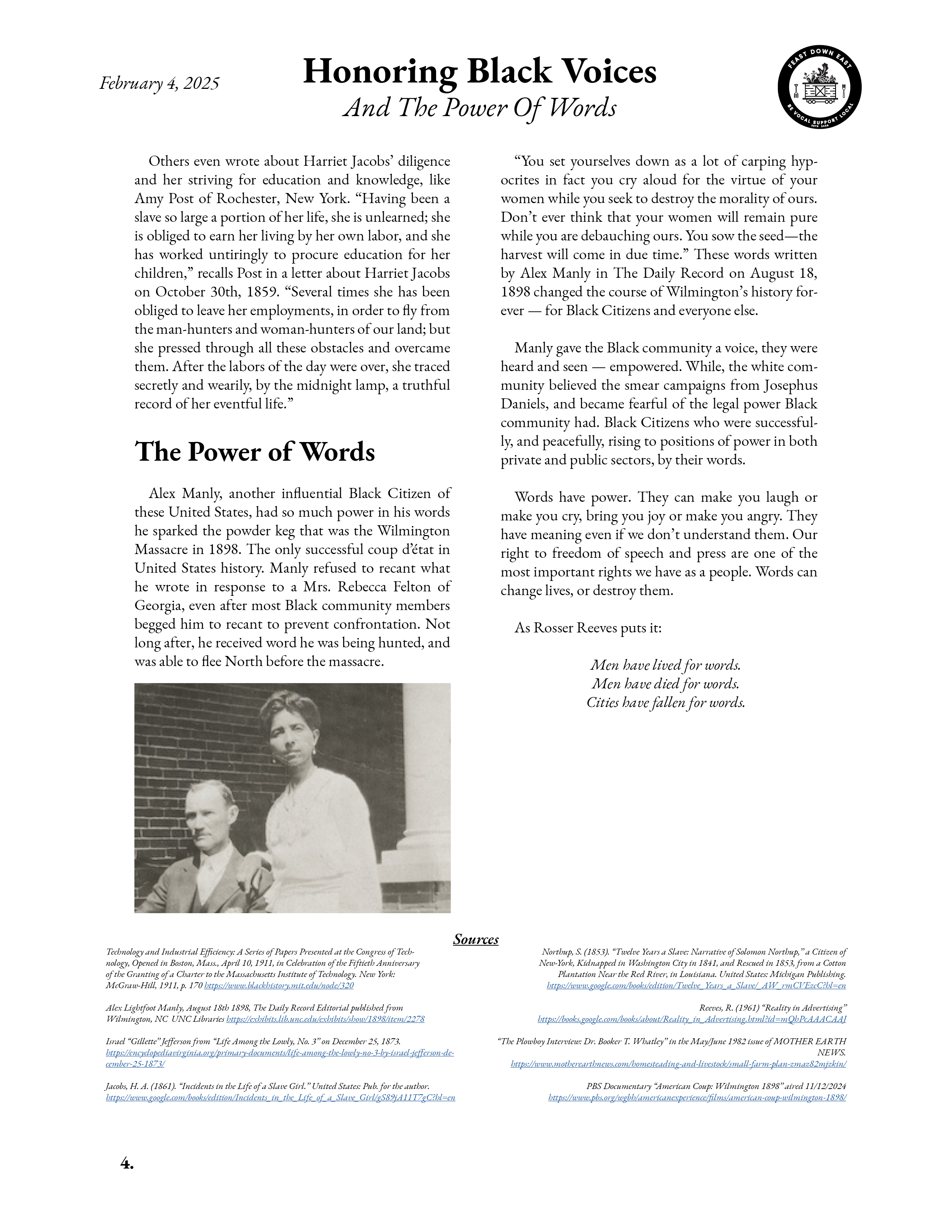Honoring Black Voices
Dear Reader & Supporter,
Thank you for taking the time to read this, and for your support however it may be. I was tasked to write the second edition of our new monthly blog series. So, for Black History Month, I figured it only fitting to highlight powerful voices in the black community.
People who believed in the power of words, knowledge and education. Some who risked their lives for these rights, to speak the truth — to tell their story. Read their stories by following the link below, and I hope you find them as interesting and enlightening as I have.
Sincerely,
Brandon Foy
Marketing Manager
Feast Down East




Honoring Black Voices & The Power Of Words
Where This All Began
“Every [Black man] lynched is called a ‘big burly, black brute,’ when in fact many of those who have thus been dealt with had white men for their fathers, and were not only not ‘black’ and ‘burly’” Alex Manly writes in The Daily Record on August 18, 1898, “but were sufficiently attractive for white girls of culture and refinement to fall in love with them as is very well known to all.”
After reading those words, I forgot I was writing a short blog for my work at the nonprofit, Feast Down East (FDE). I found myself uncovering a new world of incredible stories about the Black community’s struggle for freedom and knowledge, and the power of words.
I was only going to write about Robert Taylor and Booker T Whatley and just keep it light. I would mention how FDE’s Local Motive Mobile Farmers’ Market sets up at apartments named in honor of Robert Taylor, the first, licensed Black architect in America. Then, I would maybe write about Booker T Whatley creating the framework for Community Supported Agriculture (CSA), and how FDE’s Food Hub has a CSA box program that supports multiple local farmers, some of them Black owned.
But after a quick Google search for Robert Taylor, I stumbled on a line that said something about his understanding of the importance of education and knowledge, which started me on a journey that has been awe-inspiring and life-changing. The more I read and discovered these incredible stories, the more I saw the underlying theme, the common denominator — the importance of, and struggle for, education.
The Importance of Education
Education is of upmost importance to the benefit of everyone in society, and Robert Taylor understood that. Taylor grew up in Wilmington, North Carolina where he learned carpentry from his farther, who had a successful career and built buildings like the Bellamy Mansion Museum in Wilmington. But Taylor’s father continued to encourage him to further his education formally, and so in 1888 he travelled to Massachusetts Institute of Technology (MIT) to take the entrance exam. Taylor passed, and became the first Black graduate from MIT. After which, he went on to be the first, Black licensed architect in America, and help found and create the architectural program at the Tuskegee University in 1892.
“Some of the methods and plans of the Institute of Technology have been transplanted to the Tuskegee Institute and have flourished and grown there; if not the plans in full, certainly the spirit,” Taylor says about educations’s benefits to all. “In the love of doing things correctly, of putting logical ways of thinking into the humblest task, of studying surrounding conditions, of soil, of climate, of material and of using them to the best advantage in contributing to build up the immediate community in which the persons live, and in this way increasing the power and the grandeur of the nation.”
Another prominent figure but within agriculture, was Booker T. Whatley, a professor at Tuskegee University decades after Robert Taylor. Whatley understood the importance of building up the community around oneself, like Taylor says. Booker T Whatley revolutionized small-scale farming with the pick-your-own and Community Supported Agriculture (CSA) models. Demonstrating how knowledge and education are not just a means to freedom, but a tool for economic independence for one’s community and beyond.
“Actually, I put my small farm idea together only after I came to Tuskegee Institute in 1973,” Whatley says in his 1982 interview The Small Farm Plan with Mother Earth News, “and it was my work with sweet potatoes that took me there from Southern University in Louisiana.” Through Whatley’s work as an educator, and the words he wrote, he continues influencing agriculture today, helping Black farmers gain financial freedom.
The Journey to Freedom & Knowledge
Knowledge and education, or words, are more valuable than gold, some even say more valuable than bread — words are the bread of life. Words open a world of possibilities. They are revered by some, and feared by others. They can change minds, and they can change laws. Words hold weight, and power — whether written, or spoken. The more I searched and thought about what I was going to write, the more the weight of the words I’ve heard and read lately laid heavy. Words from men like Israel Gillette Jefferson, who moved to Cincinnati, Ohio from Monticello, Virginia in 1843 after gaining his freedom.
“Since I have been in Ohio I have learned to read and write, but my duties as a laborer would not permit me to acquire much of an education.” Israel Gillette Jefferson says in his 1873 memoir Life Among The Lowly, “But such as I possess I am truly thankful for, and consider what education I have as a legitimate fruit of freedom.” A chance carriage ride during a visit from General Marquis de Lafayette, while on his Farewell Tour to see Thomas Jefferson in 1824, led Gillette to hold education and knowledge in such high regards. He recalls this influential visit in the same memoir:
Lafayette remarked that he thought that the slaves ought to be free; that no man could rightfully hold ownership in his brother man; that he gave his best services to and spent his money in behalf of the Americans freely because he felt that they were fighting for a great and noble principle—the freedom of mankind; that instead of all being free a portion were held in bondage, (which seemed to grieve his noble heart); that it would be mutually beneficial to masters and slaves if the latter were educated, and so on.
Mr. Jefferson replied that he thought the time would come when the slaves would be free, but did not indicate when or in what manner they would get their freedom. He seemed to think that the time had not then arrived. To the latter proposition of Gen. Lafayette, Mr. Jefferson in part assented. He was in favor of teaching the slaves to learn to read print; that to teach them to write would enable them to forge papers, when they could no longer be kept in subjugation. This conversation was very gratifying to me, and I treasured it up in my heart.
After hearing those words my entire perspective shifted even more than it had before, a completely different side than I heard. Gillette valued and cherished words and education as the fruit of freedom, but there have been others who fear the power of words. This fear of knowledge, of written words, of education, was at the front of slave owners minds, because they knew the transformative power words hold. The innocent enslaved humans who fought for their freedom to read, write and much more, knew the power of words. Many of these people risked their lives to tell their stories, reliving the atrocities they endured because they knew the power in the words they shared.
“I have not written my experiences in order to attract attention to myself; on the contrary, it would have been more pleasant to me to have been silent about my own history,” writes Harriet Jacobs in The Incidents in the Life of a Slave Girl in 1861. “Neither do I care to excite sympathy for my own sufferings. But I do earnestly desire to arouse the women of the North to a realizing sense of the condition of two millions of women at the South, still in bondage, suffering what I suffered, and most of them far worse.” In her book she writes about the years of suffering she endured under a cruel slave master, eventually hiding for seven years in an attic to avoid his advances until she could gain her freedom. After escaping to freedom in 1835 Harriet Jacobs began working with abolitionists, but it still took some time and convincing from her friends to share her story with the world.
Though some, like Solomon Northup, couldn’t wait a moment to share their stories, to open eyes and ears to the atrocities of slavery. Northup was a free Black citizen of New York, who was kidnapped and sold into slavery for 12 years. After escaping and returning home to Saratoga, New York in 1853, he wrote and published his book Twelve Years A Slave that same year. Northup’s book was one of the most pivotal and life-changing things I’ve ever read or heard. The power of his words still rings true today.
Fear of an Educated Black Community
Solomon Northup’s story is a wild journey just to read, it stays with you, but there are specific moments he writes about that I still think about after reading his book many years ago. For example, what he says about one of the atrocious slave masters during his enslavement, in his book Twelve Years A Slave:
“Soon after he purchased me, Epps asked me if I could write and read, and on being informed that I had received some instruction in those branches of education he assured me, with emphasis, if he ever caught me with a book, or with pen and ink, he would give me a hundred lashes. He said he wanted me to understand that he bought [slaves] to work and not to educate.”
This fear that slave owners had of education and knowledge, especially for slaves, was in complete contrast with the Black community and their love and yearning for knowledge and words. In his book, Northup mentions his father’s devotion to knowledge, saying how his father had “given us an education surpassing that ordinarily bestowed upon children in our condition.”
Harriet Jacobs was another incredible parent who focused her attention on providing for her children with both physical and mental sustenance, like education, while occasionally finding time to write her story down. “I was born and reared in Slavery ;” writes Jacobs in her book The Incidents in the Life of a Slave Girl, “and I remained in a Slave State twenty-seven years. Since I have been at the North, it has been necessary for me to work diligently for my own support, and the education of my children.”
Others even wrote about Harriet Jacobs’ diligence and her striving for education and knowledge, like Amy Post of Rochester, New York. “Having been a slave so large a portion of her life, she is unlearned; she is obliged to earn her living by her own labor, and she has worked untiringly to procure education for her children,” recalls Post in a letter about Harriet Jacobs on October 30th, 1859. “Several times she has been obliged to leave her employments, in order to fly from the man-hunters and woman-hunters of our land; but she pressed through all these obstacles and overcame them. After the labors of the day were over, she traced secretly and wearily, by the midnight lamp, a truthful record of her eventful life.”
The Power of Words
Alex Manly, another influential Black Citizen of these United States, had so much power in his words he sparked the powder keg that was the Wilmington Massacre in 1898. The only successful coup d’état in United States history. Manly refused to recant what he wrote in response to a Mrs. Rebecca Felton of Georgia, even after most Black community members begged him to recant to prevent confrontation. Not long after, he received word he was being hunted, and was able to flee North before the massacre.
“You set yourselves down as a lot of carping hypocrites in fact you cry aloud for the virtue of your women while you seek to destroy the morality of ours. Don’t ever think that your women will remain pure while you are debauching ours. You sow the seed—the harvest will come in due time.” These words written by Alex Manly in The Daily Record on August 18, 1898 changed the course of Wilmington’s history forever — for Black Citizens and everyone else.
Manly gave the Black community a voice, they were heard and seen — empowered. While, the white community believed the smear campaigns from Josephus Daniels, and became fearful of the legal power Black community had. Black Citizens who were successfully, and peacefully, rising to positions of power in both private and public sectors, by their words.
Words have power. They can make you laugh or make you cry, bring you joy or make you angry. They have meaning even if we don’t understand them. Our right to freedom of speech and press are one of the most important rights we have as a people. Words can change lives, or destroy them.
As Rosser Reeves puts it:
Men have lived for words.
Men have died for words.
Cities have fallen for words.
SOURCES
Technology and Industrial Efficiency: A Series of Papers Presented at the Congress of Technology, Opened in Boston, Mass., April 10, 1911, in Celebration of the Fiftieth Anniversary of the Granting of a Charter to the Massachusetts Institute of Technology. New York: McGraw-Hill, 1911, p. 170 https://www.blackhistory.mit.edu/node/320
Alex Lightfoot Manly, August 18th 1898, The Daily Record Editorial published from Wilmington, NC UNC Libraries https://exhibits.lib.unc.edu/exhibits/show/1898/item/2278
Israel “Gillette” Jefferson from “Life Among the Lowly, No. 3” on December 25, 1873.
https://encyclopediavirginia.org/primary-documents/life-among-the-lowly-no-3-by-israel-jefferson-december-25-1873/
Jacobs, H. A. (1861). “Incidents in the Life of a Slave Girl.” United States: Pub. for the author.
https://www.google.com/books/edition/Incidents_in_the_Life_of_a_Slave_Girl/gS89jA11T7gC?hl=en
Northup, S. (1853). “Twelve Years a Slave: Narrative of Solomon Northup,” a Citizen of New-York, Kidnapped in Washington City in 1841, and Rescued in 1853, from a Cotton Plantation Near the Red River, in Louisiana. United States: Michigan Publishing.
https://www.google.com/books/edition/Twelve_Years_a_Slave/_AW_rmCVEzcC?hl=en
Reeves, R. (1961) “Reality in Advertising”
https://books.google.com/books/about/Reality_in_Advertising.html?id=mQhPcAAACAAJ
“The Plowboy Interview: Dr. Booker T. Whatley” in the May/June 1982 issue of MOTHER EARTH NEWS.
https://www.motherearthnews.com/homesteading-and-livestock/small-farm-plan-zmaz82mjzkin/
PBS Documentary “American Coup: Wilmington 1898” aired 11/12/2024
https://www.pbs.org/wgbh/americanexperience/films/

Brandon and FDE staff. Thank you for sharing this powerful local history. We must always remember, “words have power”